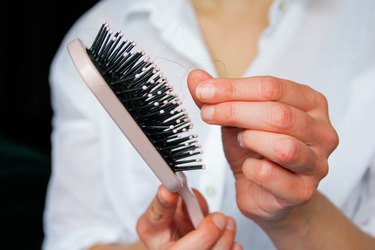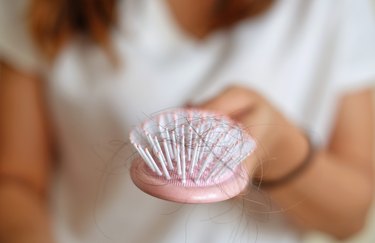
If you go on an antidepressant or start taking the birth control pill, you may be surprised to discover a nasty little side effect that no one warned you about: hair loss.
But it's more common than many of us realize.
Video of the Day
Video of the Day
Certain medications can cause hair loss because they interfere with the normal growth cycle of the hair follicles, says Debra Jaliman, MD, professor of dermatology at the Mount Sinai School of Medicine in NYC and author of Skin Rules: Trade Secrets from a Top NYC Dermatologist. When hair follicles can't grow properly, hair may fall out.
The good news: Hair loss from medication is often temporary, which means that once you stop the drug, your tresses will bounce back to normal, Dr. Jaliman says. But it can still be unnerving and decrease self-esteem. Here's what you need to know.
Warning
Do not stop taking a medication unless advised by your doctor. Stopping some medications abruptly can have serious health consequences, if not done so under medical supervision.
How Does Hair Grow?
To understand how you lose hair, it can be helpful to know how hair grows in the first place. Hair follicles cycle through the following four phases (with some follicles in each phase at any given moment), according to a February 2017 study in Clinical, Cosmetic and Investigational Dermatology:
- Anagen phase: During this phase, the cells in your hair roots divide, leading to rapid hair growth. This lasts three to five years.
- Catagen phase: This is the transition period of hair growth. Hair follicles shrink, which causes hair growth to slow down. It lasts about 10 days.
- Telogen phase: This is the resting phase of hair growth, which lasts about three months.
- Exogen phase: During this phase, which lasts about three to five months, you shed old hair.
During normal hair cycling, the majority of follicles — around 90 percent — are in the anagen or growth phase, per the Clinical, Cosmetic and Investigational Dermatology study.
8 Medications That Can Cause Hair Loss
Medications can lead to two kinds of hair loss: telogen effluvium, or anagen effluvium. Telogen effluvium is the more common one, says Susan Massick, MD, associate professor of dermatology at the Ohio State University College of Medicine.
"With telogen effluvium, your hairs shift prematurely into the telogen/resting phase, stop growing and then shed, usually a few months after starting a medication," Dr. Massick says.
Anagen effluvium, on the other hand, happens as a result of a toxic or inflammatory event to the scalp, per StatPearls.
Here are some of the more common drugs that can cause both, per the American Hair Loss Association.
1. Acne Medication
Acne medication (a drug that's derived from vitamin A) may be good for acne-prone skin, but it's bad for your scalp, says dermatologist and hair loss specialist Michael May, FRCS, director of the Wimpole Clinic in London.
The most common acne medication that creates this issue is accutane, or isotretinoin.
"Vitamin A is a very important nutrient for the hair, as it can actually help it grow," he says. "But when you take high amounts, your hair follicles can go into overdrive."
This makes your hair reach the end of its development phase faster than usual, making it fall out. And since your body can't produce new hair quickly enough to replace it, you may experience hair thinning or even bald patches, May says.
2. Blood Thinners
Blood thinners are an important medication for those at risk of blood clots and those with heart conditions like irregular heart rhythm, heart attack or stroke, per the Oklahoma Heart Hospital.
But, some common blood thinners may cause hair loss. These include, per the American Hair Loss Association:
- Panwarfin (warfarin sodium)
- Sofarin (warfarin sodium)
- Coumadin (warfarin sodium)
- Heparin injections
Instead, your doctor may recommend a newer class of blood thinners — drugs like pradaxa (dabigatran), xarelto (rivaroxaban) and eliquis (apixaban) — which are less likely to cause this problem, Dr. Jaliman says.
3. Anti-seizure Medications
Along with upset stomach, dizziness and blurred vision, anti-seizure medications like tridone (trimethadione) may cause hair loss as a potential side-effect.
"Hair loss has been listed as one of the more common side effects of these drugs," Dr. Jaliman says. But most of the time, it's mild enough that patients can successfully stay on these medications.
4. Certain Antidepressants
While anxiety itself can sometimes cause (stress-induced) hair loss, medications that treat anxiety can also make your hair fall out.
Some common antidepressants that may cause hair loss include, per the American Hair Loss Association:
- Selective serotonin reuptake inhibitors (SSRIs) like prozac (fluoxetine hydrochloride), zoloft (sertraline hydrochloride) and paxil (paroxetine)
- Tricyclic antidepressants like elavin (amitriptyline), pamelor (nortriptyline) and imipramine (tofranil)
5. Beta-Blockers
Beta blockers are medications that block the hormone epinephrine in the body, which causes the heart to beat more slowly, per the Mayo Clinic.
Beta blockers are used to treat high blood pressure, and may also cause hair loss in this instance. These include, per the American Hair Loss Association:
- Tenormin (atenolol)
- Lopressor (metoprolol)
- Corgard (nadolol)
- Inderal and Inderal LA (propanolol)
- Blocadren (timolol)
Beta blockers can also be used to treat glaucoma. Some beta blockers used to treat this eye condition, like timoptic (timolol), have been linked to hair loss. It's been found, however, that a newer glaucoma drug called bimatoprost, can have the opposite effect by stimulating hair regrowth, according to a January 2022 study in Drug Delivery.
6. Hormonal Contraceptives
Any birth control method that contains estrogen — like the patch, the pill or the vaginal ring — can cause hair loss. This is because of all the hormonal changes happening in your body.
"When your body experiences shock or stress — in this case, sudden changes in hormone levels via the pill — the hair roots are pushed prematurely into the resting state," says Anna Chacon, MD, a dermatologist in Miami, Florida. In that time, about 70 percent of your scalp hair will shed, causing hair loss.
But don't fret: This is temporary, she says.
"Once your body adjusts to the pill's hormonal effect, your hair loss will return to normal within six to twelve months," Dr. Chacon says.
Tip
The birth control injection Depo-Provera can also cause hair loss, since it contains the hormone progesterone, Dr. Jaliman says. “That’s why if I have patients who are worried about it, I advise them to just use birth control pills, instead," she adds.
7. Prescription Anti-Inflammatory Medication
Autoimmune conditions like rheumatoid arthritis (RA) and lupus can cause hair loss, but sometimes, the medications used to relieve your symptoms have the same effect.
The two most common anti-inflammatory medications that cause hair loss include, according to the Arthritis Foundation:
- Methotrexate: This drug is responsible for hair loss in up to 3 percent of all users. It treats inflammation by stopping cells from growing, which includes hair follicles.
- Arava (leflunomide): This medication causes hair loss in about 10 percent of all users, for the same reasons as methotrexate, per the Arthritis Foundation.
8. Chemotherapy Medication
While these medications are powerful enough to kill rapidly growing cancer cells, they can also destroy healthy growing cells, like those in your hair roots, Dr. Massick says.
When you undergo chemotherapy for cancer treatment, your hair cells in the anagen growth phase stop growing. Hair begins to shed shortly after you start treatment.
This is also temporary, though. "Your hair will grow back three to six months after your treatment ends," she adds, "although it may temporarily be a different color or texture (i.e., curly instead of straight)."
Is Hair Loss More Common in Men or Women?
While both men and women can experience drug-related hair loss, the effects are often noticed more in women.
"Women are not necessarily more susceptible to hair loss, but they may be more self-conscious about their appearance, more concerned about the thinning and more likely to seek help in addressing their hair loss," Dr. Massick says. That may lead to them taking hair-growth supplements, or turning to topical treatments for hair loss.
How to Reverse Hair Loss From Medication
Hair loss is a common side effect for several medications, but there are ways to reduce hair loss and maintain hair health while taking these medications. Here are a few tips:
Adjust Your Diet
Diet can't reverse your hair loss, but it can help minimize some of the damage, Dr. Massick says. "A well-balanced diet with vitamins, minerals, nutrients and protein is important," she adds.
Indeed, a March 2020 review in Skin Appendage Disorders analyzed 24 studies and found the Mediterranean diet, as well as diets rich in protein and soy, may be used as a therapy for hair loss, since they contain anti-inflammatory nutrients that promote hair health and growth.
Dr. Massick also recommends that you ask your doctor to check your iron and ferritin levels, since both are important for hair growth.
"Avoid very low calorie diets, or extreme diets, since they often don't provide you with the nutrients you need for hair health," she adds.
Talk to Your Doctor
The only way to reverse hair loss from medication is to stop the medication, Dr. Massick says. But this may or may not be possible, depending on the medication you are taking.
If your hair loss is due to high blood pressure medications, a swap may be easy — for instance, you can switch from beta blockers to another option, such as an ACE inhibitor or diuretic, according to Dr. Massick. But if you're on an anti-inflammatory medication to treat a condition like RA, it may not be an easy switch.
In these cases, you have to weigh the benefits of the drug against the distress you may feel about your hair loss, Dr. Massick says.
Be Patient
Most of the time, when you stop the drug, your hair will grow back in. But, "waiting for the regrowth or the reversal of medication-induced hair loss can feel like an eternity," Dr. Massick says.
"Remember that while there can be a three- to six-month lag time between starting a medication and noticing the hair loss, the regrowth of hair can take even longer — often up to 12 to 18 months," she adds.
Rest assured: You will not go permanently bald. In the meantime, Dr. Massick recommends the following steps:
- Avoid putting too much stress on your scalp (this causes faster shedding and more of your hair to fall out).
- Avoid tight braids or ponytails.
- Don't add hair extensions.
- Minimize any chemicals applied to your scalp, like highlights or hair dyes, for several months.
Patience and time is key, she stresses. "Most of the time, hair grows back," Dr. Massick says.
- Clinical, Cosmetic and Investigational Dermatology: Promotion of anagen, increased hair density and reduction of hair fall in a clinical setting following identification of FGF5-inhibiting compounds via a novel 2-stage process
- Arthritis Foundation: Arthritis Medications and Hair Loss
- Skin Appendages Disorders: The Role of Diet as an Adjuvant Treatment in Scarring and Nonscarring Alopecia
- StatPearls: "Anagen Effluvium"
- Drug Delivery: "Preparation of topical bimatoprost with enhanced skin infiltration and in vivo hair regrowth efficacy in androgenic alopecia"
- Oklahoma Heart Hospital: "What patients need to know about blood thinners"
- Mayo Clinic: "Beta blockers"
Is this an emergency? If you are experiencing serious medical symptoms, please see the National Library of Medicine’s list of signs you need emergency medical attention or call 911.


